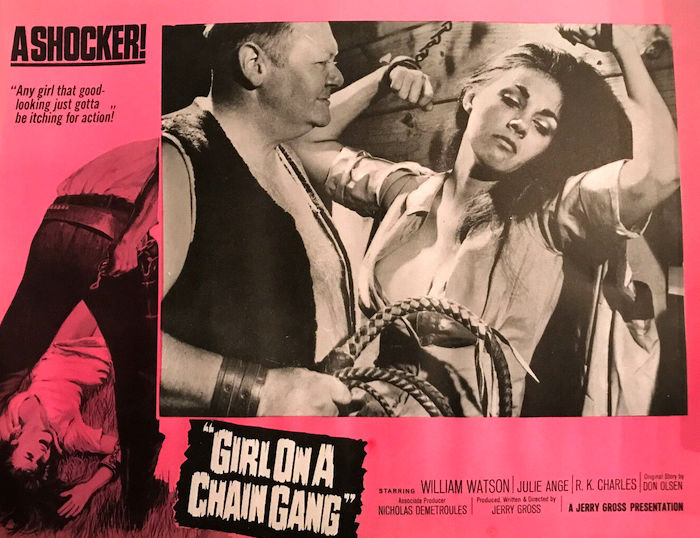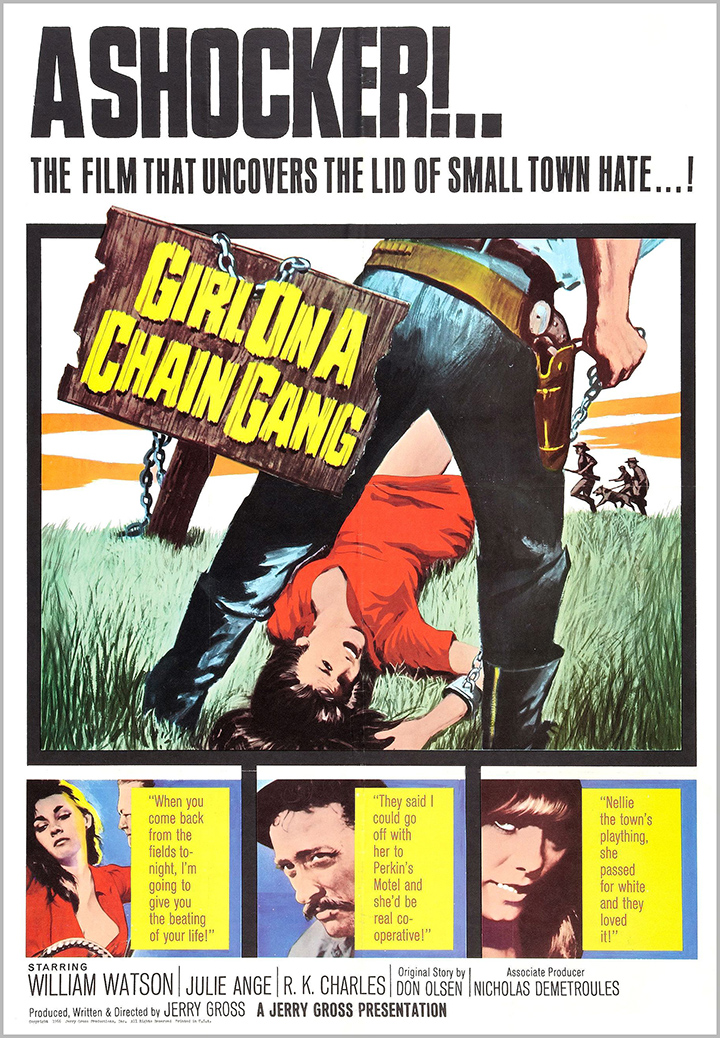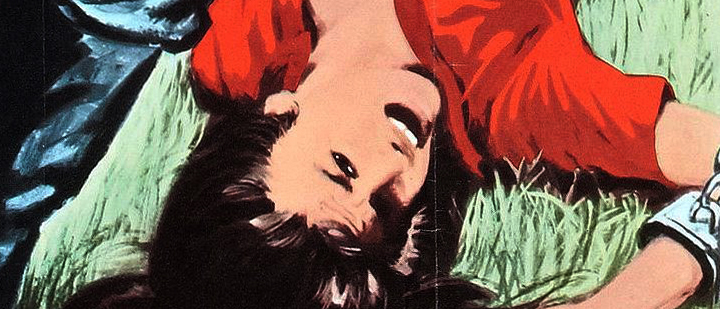
That’s exploitation!
‘Girl on a Chain Gang’
The Film Detective and Something Weird Video
$24.95 (Blu-ray), $19.95 (DVD)
96 minutes plus special features
Not rated
By Mark Voger, author
‘Britmania: The British Invasion of the Sixties in Pop Culture’
It’s a low-budget exploitation quickie about a powder-keg topic made by a first-time director with no-name actors in which Long Island is passed off as the Deep South.
That may not sound promising, but then again, exploitation fans have a high tolerance for dubious productions.
Jerry Gross‘ “Girl on a Chain Gang” — out this week from The Film Detective and Something Weird Video — is a frequently hard-to-watch film. I’d call it “anger porn” with intermittent snatches of good stuff. My term alludes to the anger the viewer feels in watching innocent youths tormented, raped or murdered by supposed upholders of the law for the crime of passing through town.
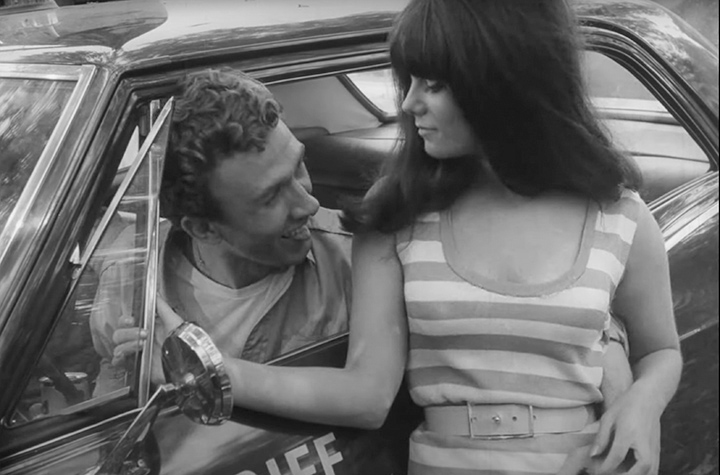
Setup: Near a sign that says “Welcome to Carson’s Landing, a Small Friendly Town,” two beer-swilling deputies (R.K. Charles and Peter Nevard) pull over a convertible with three young people who don’t look like they’re from around here. The youths’ racial/gender makeup particularly offends the coppers. Jean (Julie Ange) and Ted (Ron Segal) are White, Artie (actor unidentified) is Black.
The deputies bring the three “suspects” — who happen to be Civil Rights activists — to their sadistic boss, Sheriff Sonny Lew (William C. Watson), and the real psychodrama begins. Sonny Lew verbally abuses them, assaults them, takes their cash, and then sets them free, later instructing his deputies to follow and re-arrest them. After the youths are incarcerated, Sonny Lew dispatches Nellie (Arlene Sue Farber), a local woman of ill repute, to Artie’s cell, where she offers her body to coerce him into signing a confession. Artie doesn’t bite, so to speak.
It all leads to a sham trial, with Jean — convicted of prostitution by a kangaroo court — being sentenced to work on a chain gang populated exclusively, until now, by Black men.
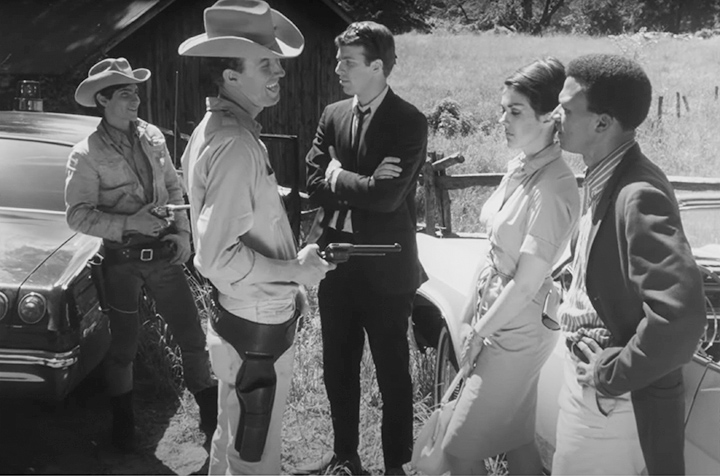
The black-and-white cinematography by George Zimmerman (who later shot 20 episodes of “Good Times”) is well executed, but the audio quality wavers. An actor named James Harvey, for whom “Girl on a Chain Gang” is his only apparent credit, plays two roles in the same sequence (!), as a testifying saloon owner and the trial judge. (The latter role is played for laughs, which would seem out of place, but somehow it works.) Watson, making his film debut here, went on to play the slave trader who captures Kunta Kinte (LeVar Burton) in the 1977 miniseries “Roots.”
Originally titled “Bayou,” “Girl on a Chain Gang” is loosely based on an infamous 1964 incident in Mississippi in which three members of CORE (Congress of Racial Equality) were shot and buried by Ku Klux Klan members, none of whom were convicted of murder. Does it seem like this movie exploited the tragedy? For better or (much) worse, that’s why their called “exploitation movies.”
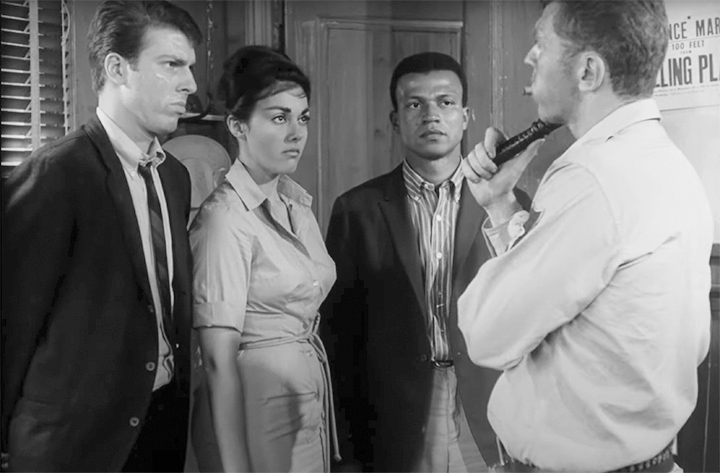
Much of the new home video release’s supplemental material focuses on Gross, an under-the-radar figure in the film world, except among exploitation fans. In the accompanying short doc “It’s All in the Title: Exploiting Jerry Gross,” narrator Chris Poggiali briskly lays out Gross’ multifaceted career on the fringes of cinema.
Gross (1940-2002) was a distributor — a hustler, really — who sometimes produced his own films, and honed a penchant for importing softcore and horror films, which he would tweak for American audiences. Gross was once married to Farber, a clever actress with a sultry look who starred in two softcore films he directed, “Teenage Mother” (1967) and “The Female Animal” (1970).
Among Gross’ softcore imports are “Inga,” “The Seduction of Inga” and “Fanny Hill” (all 1968). Horror films distributed by Gross include “I Eat Your Skin” (1971), “I Drink Your Blood” (1970), “I Spit on Your Grave” (1978) and “Zombie” (1979). Gross also put out blaxploitation films such as “The Black Six” (1973) and “The Black Godfather” (1974), and was behind the 1970 re-release of “Mondo Cane.”
In other words, this guy had just about every sub-category of exploitation covered. According to Poggiali, Gross lived out his final years as a presumed agoraphobic, and died at age 62 in a “skid row” hotel room.
Special features include audio commentary by author Jennifer Churchill; a booklet with an essay by Lisa Petrucci of Something Weird; and Ballyhoo Motion Pictures’ profile of Gross.
